A friend of mine who just finished school asked me if I could suggest some films for him to watch on Netflix Instant. I've written a number of annotated recommendations for him, so I figured I may as well share slightly edited versions here as well. I'll roll these out every so often, and I may write longer pieces on any of these in the future. Each of the films below were available on Netflix Instant in the USA at the time this was published.
House of Pleasures
L'Apollonide (Souvenirs de la maison close) / House of Tolerance
2011, France
Bertrand Bonello
You could spend an entire day coming up with adjectives to describe this film about the young women, their madame, her children, their clients, and the ghosts that inhabit a Parisian whorehouse at the dawn of the 20th century: beautiful, frightening, elegant, decadent, erotic, mysterious, haunting, radical, moving, difficult, luminous, and so on. But none of those words could accurately describe the total experience of watching Bertrand Bonello's unshakeable masterpiece.
With: Noémie Lvovsky, Alice Barnole, Céline Sallette, Adèle Haenel, Hafsia Herzi, Iliana Zabeth, Jasmine Trinca, Laurent Lacotte, Xavier Beauvois, Louis-Do de Lencquesaing, Jacques Nolot, Judith Lou Lévy, Anaïs Thomas, Pauline Jacquard, Maïa Sandoz, Joanna Grudzinska, Esther Garrel, Pierre Léon, Jean-Baptiste Verquin, Michel Peteau, Marcelo Novais Teles, Guillaume Verdier, Justin Taurand, Damien Odoul, Paul Moulin, Henry Lvovsky, Paolo Mattei, Frédéric Epaud, Anaïs Romand, Vincnet Dieutre, Bertrand Bonello, Pascale Ferran
Domain
Domaine
2009, France/Austria
Patric Chiha
In what was John Waters' unexpected (but not unusual) favorite film of 2010, Béatrice Dalle, still a smoldering presence onscreen twenty years after Betty Blue, plays an alcoholic mathematician who is also a sort of mentor to her beautiful gay teenage nephew (Isaïe Sultan). It's neither a coming-of-age story nor a PSA for addiction, but instead a rather intimate portrait of the alternately tender and toxic relationship between these two misfits. There's a great club scene a little over half way into the film where a bunch of people dance bizarrely in a smoke-filled, infinitely negative space.
With: Béatrice Dalle, Isaïe Sultan, Alain Libolt, Raphaël Bouvet, Sylvia Roher, Bernd Birkhahn, Udo Samel, Tatiana Vialle, Manuel Marmier, Gisèle Vienne, Gloria Pedemonte, Thomas Landbo
Flirting with Disaster
1996, USA
David O. Russell
Flirting with Disaster was a film I couldn't appreciate at a young age for a variety of reasons, but revisiting it as an adult had me crying with laughter. David O. Russell's brand of humor is a unique blend of chatty New York high-brow and slapstick-y absurdism, which you can also see at work in I Heart Huckabee's, a film I've changed my opinion on at least three times. While Ben Stiller is easily replaceable in the central role of the new daddy who wants to find his birth parents before naming his son, the entire supporting cast is priceless, particularly Mary Tyler Moore as Stiller's high-strung adoptive mother, Téa Leoni as the hapless psychology student documenting the eventual reunion, and–above all–Lily Tomlin, who steals the show.
With: Ben Stiller, Patricia Arquette, Téa Leoni, Mary Tyler Moore, George Segal, Alan Alda, Lily Tomlin, Richard Jenkins, Josh Brolin, Glenn Fitzgerald, Celia Weston, David Patrick Kelly
Mademoiselle
1966, France/UK
Tony Richardson
It would be too easy to dismiss Mademoiselle as simply a historical oddity. The screenplay was originally written by Jean Genet as a present to actress Anouk Aimée, but he reportedly sold it unbeknownst to her, and it was eventually reworked by author Marguerite Duras to be the first (and only, I believe) French-language film by director Tony Richardson, starring the one-and-only Jeanne Moreau (for whom the closeted bisexual Richardson left wife Vanessa Redgrave) and, at some point, Marlon Brando, though his casting never actually panned out. All that bizarre history aside, Mademoiselle is perfectly wicked, and Moreau is flawless as the child-hating, sexually repressed, arsonist schoolteacher, whose loins become inflamed when she meets a strapping Italian woodsman.
With: Jeanne Moreau, Ettore Manni, Keith Skinner, Umberto Orsini, Georges Aubert, Jane Beretta, Paul Barge, Pierre Collet, Gérard Darrieu, Jean Gras, Gabriel Gobin
The Lovers on the Bridge
Les amants du Pont-Neuf
1991, France
Léos Carax
Les amants du Pont-Neuf was a highly-ambitious project from French auteur Léos Carax–whose latest film Holy Motors (which stars his usual leading man Denis Lavant alongside Eva Mendes and Kylie Minogue!) is supposed to be absolutely spectacular–one which involved numerous reshoots, delays and eventually an entire reconstruction of the Pont Neuf, the oldest bridge across the Seine. There's probably no more appropriate way to describe Carax as an artist other than a visionary, and this is (not counting Holy Motors, which I haven't seen) his magnum opus, a small tale of a romance between a street performer (Lavant) and a painter (Juliette Binoche) who is going blind, told with dazzling opulence in grand measure. WARNING: Unfortunately, Netflix seems to be streaming a cropped version of the film. It looks like it's in 1.33:1 ratio, when it should be 1.85:1 (see the photo above). Such a shame for a film that utilizes the entirety of its frame so beautifully.
With: Denis Lavant, Juliette Binoche, Daniel Buain, Edith Scob, Klaus-Michael Grüber, Marion Stalens, Chrichan Larsson, Paulette Berthonnier, Roger Berthonnier, Georges Aperghis, Michel Vandestien
Showing posts with label Jeanne Moreau. Show all posts
Showing posts with label Jeanne Moreau. Show all posts
02 September 2012
Five Short Recommendations, Available on Netflix
23 October 2009
The Decade List: Le temps qui reste (2005)
 Le temps qui reste [Time to Leave] – dir. François Ozon
Le temps qui reste [Time to Leave] – dir. François OzonFans of François Ozon, once dubbed the garçon terrible of French cinema in the late ‘90s, seem to diminish with each passing film. Though few will argue that the year 2000 marked the highest point of his career (with Under the Sand and Water Drops on Burning Rocks both bowing in that year), I haven’t fallen off the bandwagon, despite a number of reservations I have toward his two most widely-seen films, 8 Women [8 femmes] and Swimming Pool, both blissfully entertaining but severely lacking beneath their polished veneer. Ozon’s thematic sequel to Under the Sand, Le temps qui reste (correctly translated as The Time That Remains), shares the same traits that bothered me about 8 Women and Swimming Pool, but they feel like less of a disguise here.
 Le temps qui reste, 8 Women and Swimming Pool all follow closely to their own genre allusions; more than its predecessor, Le temps qui reste pays tribute to melodrama, a genre which Ozon has always toiled with in smaller doses. In the film, Ozon gives himself completely over to the idea, dislodging the tongue-in-cheek sensibilities of his previous flirtations with his Sirkian tendencies. While much of the film relies on artifice, I sense a peculiar, refreshing honesty in what Ozon’s trying to do.
Le temps qui reste, 8 Women and Swimming Pool all follow closely to their own genre allusions; more than its predecessor, Le temps qui reste pays tribute to melodrama, a genre which Ozon has always toiled with in smaller doses. In the film, Ozon gives himself completely over to the idea, dislodging the tongue-in-cheek sensibilities of his previous flirtations with his Sirkian tendencies. While much of the film relies on artifice, I sense a peculiar, refreshing honesty in what Ozon’s trying to do. While he situates an attractive gay male in central role, a position often held for women in the genre, Ozon doesn’t set his sights on redefining or updating the genre. While spotted with bits of superficiality (Melvil Poupaud seems to get more handsome the closer he gets to death), the moments of beautiful clarity truly resonate. From the point early in the film when Romain (Poupaud) discovers he’s a few months away from death as a result of a spreading tumor, the film follows his grief process through the designed closures Romain concocts for the people closest to him, some successful, others not. For his unhappy, older sister Sophie (Louise-Anne Hippeau) and his younger, German boyfriend (Christian Sengewald), Romain uses his remaining time to sabotage these relationships, while finding a solitary comfort in his grandmother (Jeanne Moreau), the person in the film he finds the closest bond, both in personality and in approximation to death.
While he situates an attractive gay male in central role, a position often held for women in the genre, Ozon doesn’t set his sights on redefining or updating the genre. While spotted with bits of superficiality (Melvil Poupaud seems to get more handsome the closer he gets to death), the moments of beautiful clarity truly resonate. From the point early in the film when Romain (Poupaud) discovers he’s a few months away from death as a result of a spreading tumor, the film follows his grief process through the designed closures Romain concocts for the people closest to him, some successful, others not. For his unhappy, older sister Sophie (Louise-Anne Hippeau) and his younger, German boyfriend (Christian Sengewald), Romain uses his remaining time to sabotage these relationships, while finding a solitary comfort in his grandmother (Jeanne Moreau), the person in the film he finds the closest bond, both in personality and in approximation to death. While Ozon does strive on some level to avoid overt sentimentality, it’s more accurate to say that he keeps his drama on a low flame. I hope my friend Tom doesn’t mind, but he highlighted one of the biggest complaints I’ve heard about Le temps qui reste in an e-mail exchange earlier this year. He said, “Ozon's formal restraint may have suited his subject matter, but… I thought a showier technique wouldn't be so much inappropriate as less bland.” Perhaps it’s in Le temps qui reste’s blandness that I find the “honesty” I think Ozon is producing. In keeping the film on the subtle(r) side, Ozon delivers a number of rich moments, especially when Moreau is onscreen, that the showiness he painted 8 Women and Swimming Pool with would have only clouded. Le temps qui reste isn’t a grand triumph for the director, but it’s one that has always lingered for me, whether I can successfully defend my feelings or not (likely the latter).
While Ozon does strive on some level to avoid overt sentimentality, it’s more accurate to say that he keeps his drama on a low flame. I hope my friend Tom doesn’t mind, but he highlighted one of the biggest complaints I’ve heard about Le temps qui reste in an e-mail exchange earlier this year. He said, “Ozon's formal restraint may have suited his subject matter, but… I thought a showier technique wouldn't be so much inappropriate as less bland.” Perhaps it’s in Le temps qui reste’s blandness that I find the “honesty” I think Ozon is producing. In keeping the film on the subtle(r) side, Ozon delivers a number of rich moments, especially when Moreau is onscreen, that the showiness he painted 8 Women and Swimming Pool with would have only clouded. Le temps qui reste isn’t a grand triumph for the director, but it’s one that has always lingered for me, whether I can successfully defend my feelings or not (likely the latter). With: Melvil Poupaud, Jeanne Moreau, Valeria Bruni-Tedeschi, Daniel Duval, Marie Rivière, Louise-Anne Hippeau, Christian Sengewald, Henri Le Lorme, Walter Pagano, Ugo Soussan Trabelsi
With: Melvil Poupaud, Jeanne Moreau, Valeria Bruni-Tedeschi, Daniel Duval, Marie Rivière, Louise-Anne Hippeau, Christian Sengewald, Henri Le Lorme, Walter Pagano, Ugo Soussan TrabelsiScreenplay: François Ozon
Cinematography: Jeanne Lapoirie
Country of Origin: France
US Distributor: Strand Releasing
Premiere: 16 May 2005 (Cannes Film Festival)
US Premiere: 14 July 2006
13 March 2008
Jeanne Moreau and other divas...
 blaq out will be releasing Marguerite Duras' Nathalie Granger, from 1972 and starring Jeanne Moreau and Gérard Depardieu, in both single disc and double-disc editions on 27 May. Both editions run pretty steep (the single disc is $39.95, the deluxe edition is $69.98) for a film I doubt many people have heard of. For that matter, I doubt many people even know Duras directed films, as the most famous of her directing work, India Song, is only available in Japan.
blaq out will be releasing Marguerite Duras' Nathalie Granger, from 1972 and starring Jeanne Moreau and Gérard Depardieu, in both single disc and double-disc editions on 27 May. Both editions run pretty steep (the single disc is $39.95, the deluxe edition is $69.98) for a film I doubt many people have heard of. For that matter, I doubt many people even know Duras directed films, as the most famous of her directing work, India Song, is only available in Japan. New Yorker will release Manoel de Oliveira's Belle toujours, starring Bulle Ogier and Michel Piccoli, on 3 June.
New Yorker will release Manoel de Oliveira's Belle toujours, starring Bulle Ogier and Michel Piccoli, on 3 June. In other news, it looks like Criterion will not be releasing Jean-Jacques Beiniex's Diva on DVD, but Lionsgate instead, under a collection entitled Meridian. Neither Eric at Filmbo's Chick Magnet nor I have any idea what this label is all about, except that they will also be releasing The Red Violin on 6 June. More info as I find out.
In other news, it looks like Criterion will not be releasing Jean-Jacques Beiniex's Diva on DVD, but Lionsgate instead, under a collection entitled Meridian. Neither Eric at Filmbo's Chick Magnet nor I have any idea what this label is all about, except that they will also be releasing The Red Violin on 6 June. More info as I find out.
22 February 2008
Malle and Korda from Criterion in May
12 October 2007
Time-Wasting (in the bad sense of the term)
 I’ve been thinking a lot about Sean Penn’s Into the Wild lately, though not because of any haunting quality about the film (my full review will be posted next week here and on Playback's website), but that it has all the makings of one of those over-appreciated films that first-year undergrads cream over. A friend of a friend made a comment about Wim Wenders’ Wings of Desire, stating, “it appeals to the undergrad in all of us.” I’ve been thinking lately how that has changed for the worse. I can see where he’s coming from, though I have a guiltless, yet hardly impassioned, liking for the film. I think as time goes by, a film like Wings of Desire has gone over the head of the peons of the pre-graduate collegiate study. Instead, something a bit more manageable and whimsical (a word I hate) like Amèlie and Eternal Sunshine of the Spotless Mind have replaced the likes of Eraserhead as standards for these individuals. Alas, I digress. What’s truly unfortunate about Into the Wild is that it pains of the staleness of self-importance. Penn has been running around promoting his ambitiously middling meditation of the existence of man (God, too bad Antonioni had to die before seeing the shallowness of Penn’s perspective), even garnering the attention of Miss Oprah Winfrey, whose taste in literature looks scholarly in comparison to her appreciation of film (shoot me if I’m wrong, but I thought I overheard someone say that she compared Paul Haggis’ abortion-to-turn-Roe-v-Wade Crash to Citizen Kane). Penn is not a filmmaker, and if you need an example of such, notice his pedestrian motif to show the passing of time, which he’s so proud of that he uses at least ten or so times throughout the film. Penn couldn’t even find an actor capable of selling whatever it is that he’s throwing out there, let alone lift the film above its mediocrity. In Emile Hirsch, he finds an actor of a certain sheepish capacity, who apparently performs all of his own stunts, none of which the least bit marvelous. I guess it should say something that Hirsch was outshined by Justin Timberlake in Alpha Dog. Thankfully, Penn enlisted some fine supporting talent, particularly from Catherine Keener, who, even in tripe like Lovely & Amazing, always floats my boat. As Hirsch’s parents, William Hurt and Marcia Gay Harden effectively ham it up, and even the usually painstaking Jena Malone makes for a fine occasional narrator (Penn can’t commit to anything here). I’m sure a bunch of young folks (not to mention the members of Oprah’s cult) whose intelligence is exceedingly surpassed by their own egoism will jump all over this, and, I ask, isn’t this upsetting?
I’ve been thinking a lot about Sean Penn’s Into the Wild lately, though not because of any haunting quality about the film (my full review will be posted next week here and on Playback's website), but that it has all the makings of one of those over-appreciated films that first-year undergrads cream over. A friend of a friend made a comment about Wim Wenders’ Wings of Desire, stating, “it appeals to the undergrad in all of us.” I’ve been thinking lately how that has changed for the worse. I can see where he’s coming from, though I have a guiltless, yet hardly impassioned, liking for the film. I think as time goes by, a film like Wings of Desire has gone over the head of the peons of the pre-graduate collegiate study. Instead, something a bit more manageable and whimsical (a word I hate) like Amèlie and Eternal Sunshine of the Spotless Mind have replaced the likes of Eraserhead as standards for these individuals. Alas, I digress. What’s truly unfortunate about Into the Wild is that it pains of the staleness of self-importance. Penn has been running around promoting his ambitiously middling meditation of the existence of man (God, too bad Antonioni had to die before seeing the shallowness of Penn’s perspective), even garnering the attention of Miss Oprah Winfrey, whose taste in literature looks scholarly in comparison to her appreciation of film (shoot me if I’m wrong, but I thought I overheard someone say that she compared Paul Haggis’ abortion-to-turn-Roe-v-Wade Crash to Citizen Kane). Penn is not a filmmaker, and if you need an example of such, notice his pedestrian motif to show the passing of time, which he’s so proud of that he uses at least ten or so times throughout the film. Penn couldn’t even find an actor capable of selling whatever it is that he’s throwing out there, let alone lift the film above its mediocrity. In Emile Hirsch, he finds an actor of a certain sheepish capacity, who apparently performs all of his own stunts, none of which the least bit marvelous. I guess it should say something that Hirsch was outshined by Justin Timberlake in Alpha Dog. Thankfully, Penn enlisted some fine supporting talent, particularly from Catherine Keener, who, even in tripe like Lovely & Amazing, always floats my boat. As Hirsch’s parents, William Hurt and Marcia Gay Harden effectively ham it up, and even the usually painstaking Jena Malone makes for a fine occasional narrator (Penn can’t commit to anything here). I’m sure a bunch of young folks (not to mention the members of Oprah’s cult) whose intelligence is exceedingly surpassed by their own egoism will jump all over this, and, I ask, isn’t this upsetting? On television, at three-in-the-morning last night, some subsidiary of HBO or Cinemax played the finest double-feature in cable television history: The Wiz, not followed by but playing during, Less than Zero. I say finest, because one who lost their remote and bound similar to that scene in A Clockwork Orange wouldn’t have to suffer through both. Plenty of people cite Robert Altman’s Popeye as one of the worst missteps of an acclaimed director, especially in relation to the musical genre, but have they not seen Sidney Lumet’s The Wiz? Oh, it has black people in it, so we can’t be too harsh, right? Dead wrong. The Wiz is… fucking… terrible. My friend commented on this, “how could a film go so wrong with so many good people involved?“ I responded, “you mean so many good people… and Diana Ross.” I’ve always hated Diana Ross, but if you need a solid example of why you should too, see her arm-flailing performance here, fully equipped with a rat’s nest weave to boot. She has the charisma of a worn-down nickel, and I’m just glad Judy Garland was dead by the time this piece of shit came around (there seems to be an unintended theme of: thank-God-they-were-dead-before-seeing-this running through this blog). The only good song in the whole film, “Ease on Down the Road,” occurs way too late in the film to sustain any interest, and also way too far from the end to allow for one to seal the deal. At the very least, one could make plenty of nasty comments about “easing on down the road,” as my friend Mike did when realizing he hadn’t rated the film on Netflix, “ease on down the road to the fucking river and throw in this abortion.” There’s something refreshing about referring to films as abortions.
On television, at three-in-the-morning last night, some subsidiary of HBO or Cinemax played the finest double-feature in cable television history: The Wiz, not followed by but playing during, Less than Zero. I say finest, because one who lost their remote and bound similar to that scene in A Clockwork Orange wouldn’t have to suffer through both. Plenty of people cite Robert Altman’s Popeye as one of the worst missteps of an acclaimed director, especially in relation to the musical genre, but have they not seen Sidney Lumet’s The Wiz? Oh, it has black people in it, so we can’t be too harsh, right? Dead wrong. The Wiz is… fucking… terrible. My friend commented on this, “how could a film go so wrong with so many good people involved?“ I responded, “you mean so many good people… and Diana Ross.” I’ve always hated Diana Ross, but if you need a solid example of why you should too, see her arm-flailing performance here, fully equipped with a rat’s nest weave to boot. She has the charisma of a worn-down nickel, and I’m just glad Judy Garland was dead by the time this piece of shit came around (there seems to be an unintended theme of: thank-God-they-were-dead-before-seeing-this running through this blog). The only good song in the whole film, “Ease on Down the Road,” occurs way too late in the film to sustain any interest, and also way too far from the end to allow for one to seal the deal. At the very least, one could make plenty of nasty comments about “easing on down the road,” as my friend Mike did when realizing he hadn’t rated the film on Netflix, “ease on down the road to the fucking river and throw in this abortion.” There’s something refreshing about referring to films as abortions.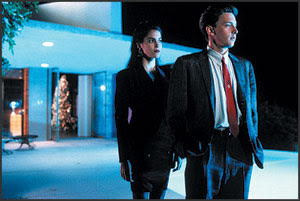 Now for Less than Zero… what a crock of dead babies (this blog has multi-layered thematic elements). Y’know, say all you want about Bret Easton Ellis, but as a high school nihilist, his books enthralled me to no end (at least Less than Zero, American Psycho and The Rules of Attraction, certainly not his awful collection of short stories entitled The Informers). He certainly captured a sect of society and youth like no one else had, likely because most of the disgustingly rich and emotionally vacant elite didn’t dare speak poorly on their legacies, bank accounts, or filthy secrets (or, they just couldn’t write). But in the film adaptation of Less than Zero, these youths are strikingly similar to those of St. Elmo’s Fire or The Breakfast Club, only with fancier abodes. I really couldn’t bring myself to watch much, as I’d seen and blocked out the film in its entirety previously, and plus, it’s not as fun making fun of Jami Gertz as it is Diana Ross.
Now for Less than Zero… what a crock of dead babies (this blog has multi-layered thematic elements). Y’know, say all you want about Bret Easton Ellis, but as a high school nihilist, his books enthralled me to no end (at least Less than Zero, American Psycho and The Rules of Attraction, certainly not his awful collection of short stories entitled The Informers). He certainly captured a sect of society and youth like no one else had, likely because most of the disgustingly rich and emotionally vacant elite didn’t dare speak poorly on their legacies, bank accounts, or filthy secrets (or, they just couldn’t write). But in the film adaptation of Less than Zero, these youths are strikingly similar to those of St. Elmo’s Fire or The Breakfast Club, only with fancier abodes. I really couldn’t bring myself to watch much, as I’d seen and blocked out the film in its entirety previously, and plus, it’s not as fun making fun of Jami Gertz as it is Diana Ross. Car Wash was also playing, and being the superior of the three aforementioned films, I opted not to watch it, though it’s worth noting that the screenplay was written by Joel Schummacher, who also wrote The Wiz. The film was directed by Michael Schultz, who also directed everyone’s other favorite musical Sgt. Pepper’s Lonely Hearts Club.
Car Wash was also playing, and being the superior of the three aforementioned films, I opted not to watch it, though it’s worth noting that the screenplay was written by Joel Schummacher, who also wrote The Wiz. The film was directed by Michael Schultz, who also directed everyone’s other favorite musical Sgt. Pepper’s Lonely Hearts Club. In conclusion (I’ve decided not to go on about how much of an… abortion the film The Apple is for now), I now understand the appeal of gay-bashing. With the combination of Schummacher and fifteen-minutes-of-fame-whore/Britney-loony Chrissy Crocker, I caught an episode or two of here! television’s The Lair, apparently a spin-off of one of their more popular gay soaps Dante’s Cove. The show stars a bunch of gay porn stars and the only major cast member of Shortbus not to shuck off his clothes, Peter Stickles, in what I firmly believe to be the biggest horseshit excuse for “entertainment” I’ve seen in… maybe forever. I really doubt gay television stations like here! or Logo are looking for a crossover audience, but I highly doubt their intention was to fuel hatred for the homosexual community. I could go on about gay cinema and its reputation, but that would take forever. In summation though, most queer cinema is dreck, starring chiseled male bodies in place of actors, or on the occasion that a film of said community is of quality (Shortbus, The Raspberry Reich, Poison, The Doom Generation, Presque rien), its anger, sexual explicitness, or “perversion” keeps its larger audience at bay. I digress, again… The Lair follows a self-proclaimed “small-town journalist trying to make it big,” who somehow manages to have a fantastic apartment in wherever the series is supposed to take place. The journalist, who has a seedy shower body-worship sequence early in the series, is aided by an informant to a string of hot-man-murders in town because, as the informant states, he seems like “a decent guy” (read: has a hot body). The show is shockingly free of mood, tension, intrigue -- and most shocking of all -- genuine eroticism. When your program makes David DeCoteau films look like high-art, you should just stop. You should see what the fags who make this bullshit look like, because maybe that would explain why someone would put up money for them to explore their sparkless sexual fantasies on film (or video as it likely is). Oh, well, no one is really holding their breath for true queer cineastes to destroy the stereotype anytime soon.
In conclusion (I’ve decided not to go on about how much of an… abortion the film The Apple is for now), I now understand the appeal of gay-bashing. With the combination of Schummacher and fifteen-minutes-of-fame-whore/Britney-loony Chrissy Crocker, I caught an episode or two of here! television’s The Lair, apparently a spin-off of one of their more popular gay soaps Dante’s Cove. The show stars a bunch of gay porn stars and the only major cast member of Shortbus not to shuck off his clothes, Peter Stickles, in what I firmly believe to be the biggest horseshit excuse for “entertainment” I’ve seen in… maybe forever. I really doubt gay television stations like here! or Logo are looking for a crossover audience, but I highly doubt their intention was to fuel hatred for the homosexual community. I could go on about gay cinema and its reputation, but that would take forever. In summation though, most queer cinema is dreck, starring chiseled male bodies in place of actors, or on the occasion that a film of said community is of quality (Shortbus, The Raspberry Reich, Poison, The Doom Generation, Presque rien), its anger, sexual explicitness, or “perversion” keeps its larger audience at bay. I digress, again… The Lair follows a self-proclaimed “small-town journalist trying to make it big,” who somehow manages to have a fantastic apartment in wherever the series is supposed to take place. The journalist, who has a seedy shower body-worship sequence early in the series, is aided by an informant to a string of hot-man-murders in town because, as the informant states, he seems like “a decent guy” (read: has a hot body). The show is shockingly free of mood, tension, intrigue -- and most shocking of all -- genuine eroticism. When your program makes David DeCoteau films look like high-art, you should just stop. You should see what the fags who make this bullshit look like, because maybe that would explain why someone would put up money for them to explore their sparkless sexual fantasies on film (or video as it likely is). Oh, well, no one is really holding their breath for true queer cineastes to destroy the stereotype anytime soon. Save your time with all that’s been mentioned above and rent Tony Richardson’s French melodrama Mademoiselle, starring the incomparable Jeanne Moreau in a script by Jean Genet and Marguerite Duras, featuring sexual repression, arson, animals in peril, and -- best of all -- fishnet gloves.
Save your time with all that’s been mentioned above and rent Tony Richardson’s French melodrama Mademoiselle, starring the incomparable Jeanne Moreau in a script by Jean Genet and Marguerite Duras, featuring sexual repression, arson, animals in peril, and -- best of all -- fishnet gloves.
02 December 2006
Short Cuts - 2 December 2007
As December is my busy month of film viewing, I figured I'd just post a few sentences and such on the films I viewed within the past two days. I may flesh some of these out at a later date, but I have a stack of DVDs sitting next to me that won't quit yelling at me.
 Sorry, Haters - dir. Jeff Stanzler - 2005 - USA
Sorry, Haters - dir. Jeff Stanzler - 2005 - USA
Allow me to introduce you to the 9/11 exploitation film. Unfortunately, it’s not as exciting as it sounds; it has yet to include a deeply offensive gore-fest about a man who goes on a killing/raping spree as the planes hit the towers. Instead, we’re stuck with unnecessary films like Oliver Stone’s World Trade Center and, here, Sorry, Haters. Don’t get this confused with World Trade Center though, as the only good thing about Sorry, Haters is that it never once tries to milk your sympathy or emotions; it’s an admirably mean-spirited and clunky film that isn’t sure if it’s meant to be an important statement on racism post-9/11 or a ludicrous comedy about the psychological effects on a woman in the corporate world. Robin Wright Penn stars as an emotionally unstable woman who deceives and manipulated a poor Muslim cab driver (Abdel Kechiche) whose brother has been deported to Syria. The film begins promisingly exploring the deep-seeded guilt of a woman whose television programming has just amplified the self-hatred in the youth of America (this is where the silly title comes from), yet Stanzler is more concerned with surprises and obnoxious deceit instead of any honest character study. Stanzler justifies Wright Penn's actions with a stupid connection the 9/11 attacks, and you can't help but think he's trying to say something powerful there. I wish I could give away the ending, but that would just ruin the only joyous moment in Sorry, Haters, but trust me, it’s a doozy, even if I have no idea what Stanlzer wanted to say with it. I also wish I could recommend Sorry, Haters in the same way I did with Shadowboxer, but unfortunately you have to sit through the rest of the annoying film to truly appreciate the hilarious explosion of an ending.
 Shem - dir. Caroline Roboh - 2004 - UK/Israel
Shem - dir. Caroline Roboh - 2004 - UK/Israel
I hate to criticize a film on its financial limitations, but that hardly excuses the awfulness that is Shem. Not only is the film ugly to look at, which is surprising considering its handsome pan-European settings, but the entire production feels amateurish. The writing is bland, the dialogue horrible, the premise absurd, and the acting painful. Ash Newman plays Daniel, a sort of devious Casanova, minus the charm, who has been sent on a mission by his Jewish grandmother to find the grave of her estranged father. This adventure, of course, serves as a lesson-learning, self-examination for the supercilious Daniel, who begins to question his heritage all while bedding numerous English-speaking women and men throughout Europe. As if Roboh doesn’t trust her audience or, most likely, herself, she feels the need to scream the word “Jew” all over the screenplay, nearly getting the point of having a line like, “Hi, I’m Daniel, arrogant Brit who denies his Jewish heritage and fucks both men and women.” There is a rather humorous scene where a woman who looks like Patsy from Absolutely Fabulous as played by Chiara Mastroianni cruises Daniel in a Jewish museum. The woman reeks of parody, a hush-voiced Eurotrash vixen with a hideous pastel skirt seeking out her prey like a wild boar. Like Sorry, Haters, moments like this are agonizingly few and only exist because they come from a wildly untrained and inept “writer/director.”
 The Double Life of Véronique (La double vie de Véronique / Podwójne zycie Weroniki)- dir. Krzysztof Kieslowski - 1991 - France/Poland/Norway
The Double Life of Véronique (La double vie de Véronique / Podwójne zycie Weroniki)- dir. Krzysztof Kieslowski - 1991 - France/Poland/Norway
The first of a string of masterworks by the late Kieslowski (if you forget about White), The Double Life of Véronique is his first trek outside of Poland, where he seemed stuck making mostly uninteresting films with no cross over-potential (The Decalogue being the exception). Likely due to the influence of the French financers or Kieslowski's own artistic experimentation, The Double Life of Véronique is blissfully cinematic, with a haunting, gorgeous score by Zbigniew Preisner and innovative, impressive cinematography from Slawomir Idziak. Starring Irène Jacob as both Polish opera singer Weronika and French music teacher Véronique, the film explores the inner workings of the universe between these two women, emotionally bound together though never actually meeting. The structure is fascinating as it never really follows a formula you’d expect from a film like this, but most importantly, it’s a beautifully executed examination on metaphysics and fate, so infinitely more resonant and effective that tripe like Amèlie. Expect my own further examination on this film at a later date.
 Time to Leave (Le temps qui reste) - dir. François Ozon - 2005 - France
Time to Leave (Le temps qui reste) - dir. François Ozon - 2005 - France
Would it surprise you that a respected French filmmaker, like Ozon, would reinterpret a genre like women’s melodramas of the 1950s into a quiet, gentle character study filled with static close-ups? Probably not, though it’s likely if you’re basing your opinion of Ozon on his successful, over-the-top 8 Women (8 femmes), but to a French film nerd like myself, I expected no less. Sort of a sequel to his ravishing Under the Sand (Sous le sable), Le temps qui reste (literally, The Time that Remains) follows thirty-one-year-old fashion photographer Romain (Melvil Poupaud) in the final stage of his life after finding out he has terminal cancer. While I enjoyed Isabel Coixet’s My Life Without Me which followed Sarah Polley through a similar grief process, Ozon’s film is softer and more restrained. Romain coasts through the film in a series of conflicting epiphanies with his family, his boyfriend, career, and, naturally, himself. The legendary Jeanne Moreau is effective as his aging grandmother, the only person he feels comfortable telling about his imminent fatality. Maybe it was the Benadryl that I took in the middle of the film, but after a rather standard, expected first half, Le temps qui reste eventually blossoms into something truly remarkable. With a schizophrenic filmography, Ozon has made a welcome return to the style that he did best with Under the Sand, stepping far away from the vivacious, but insincere 8 femmes and Swimming Pool or the gimmicky, unsuccessful 5x2. Expect further writings at a later date.
 As for which DVDs are yelling at me: I've got Pandora's Box, The Proposition, The Spirit of the Beehive, Three Times, and The Third Generation staring at me now, but you can also expect me to get around to The Conformist, 1900, The Beales of Grey Gardens, Miami Vice, Idlewild, and others in the near future. Wish me luck. Oh, and I hope you wished Woody Allen a happy birthday yesterday.
As for which DVDs are yelling at me: I've got Pandora's Box, The Proposition, The Spirit of the Beehive, Three Times, and The Third Generation staring at me now, but you can also expect me to get around to The Conformist, 1900, The Beales of Grey Gardens, Miami Vice, Idlewild, and others in the near future. Wish me luck. Oh, and I hope you wished Woody Allen a happy birthday yesterday.
 Sorry, Haters - dir. Jeff Stanzler - 2005 - USA
Sorry, Haters - dir. Jeff Stanzler - 2005 - USAAllow me to introduce you to the 9/11 exploitation film. Unfortunately, it’s not as exciting as it sounds; it has yet to include a deeply offensive gore-fest about a man who goes on a killing/raping spree as the planes hit the towers. Instead, we’re stuck with unnecessary films like Oliver Stone’s World Trade Center and, here, Sorry, Haters. Don’t get this confused with World Trade Center though, as the only good thing about Sorry, Haters is that it never once tries to milk your sympathy or emotions; it’s an admirably mean-spirited and clunky film that isn’t sure if it’s meant to be an important statement on racism post-9/11 or a ludicrous comedy about the psychological effects on a woman in the corporate world. Robin Wright Penn stars as an emotionally unstable woman who deceives and manipulated a poor Muslim cab driver (Abdel Kechiche) whose brother has been deported to Syria. The film begins promisingly exploring the deep-seeded guilt of a woman whose television programming has just amplified the self-hatred in the youth of America (this is where the silly title comes from), yet Stanzler is more concerned with surprises and obnoxious deceit instead of any honest character study. Stanzler justifies Wright Penn's actions with a stupid connection the 9/11 attacks, and you can't help but think he's trying to say something powerful there. I wish I could give away the ending, but that would just ruin the only joyous moment in Sorry, Haters, but trust me, it’s a doozy, even if I have no idea what Stanlzer wanted to say with it. I also wish I could recommend Sorry, Haters in the same way I did with Shadowboxer, but unfortunately you have to sit through the rest of the annoying film to truly appreciate the hilarious explosion of an ending.
 Shem - dir. Caroline Roboh - 2004 - UK/Israel
Shem - dir. Caroline Roboh - 2004 - UK/IsraelI hate to criticize a film on its financial limitations, but that hardly excuses the awfulness that is Shem. Not only is the film ugly to look at, which is surprising considering its handsome pan-European settings, but the entire production feels amateurish. The writing is bland, the dialogue horrible, the premise absurd, and the acting painful. Ash Newman plays Daniel, a sort of devious Casanova, minus the charm, who has been sent on a mission by his Jewish grandmother to find the grave of her estranged father. This adventure, of course, serves as a lesson-learning, self-examination for the supercilious Daniel, who begins to question his heritage all while bedding numerous English-speaking women and men throughout Europe. As if Roboh doesn’t trust her audience or, most likely, herself, she feels the need to scream the word “Jew” all over the screenplay, nearly getting the point of having a line like, “Hi, I’m Daniel, arrogant Brit who denies his Jewish heritage and fucks both men and women.” There is a rather humorous scene where a woman who looks like Patsy from Absolutely Fabulous as played by Chiara Mastroianni cruises Daniel in a Jewish museum. The woman reeks of parody, a hush-voiced Eurotrash vixen with a hideous pastel skirt seeking out her prey like a wild boar. Like Sorry, Haters, moments like this are agonizingly few and only exist because they come from a wildly untrained and inept “writer/director.”
 The Double Life of Véronique (La double vie de Véronique / Podwójne zycie Weroniki)- dir. Krzysztof Kieslowski - 1991 - France/Poland/Norway
The Double Life of Véronique (La double vie de Véronique / Podwójne zycie Weroniki)- dir. Krzysztof Kieslowski - 1991 - France/Poland/NorwayThe first of a string of masterworks by the late Kieslowski (if you forget about White), The Double Life of Véronique is his first trek outside of Poland, where he seemed stuck making mostly uninteresting films with no cross over-potential (The Decalogue being the exception). Likely due to the influence of the French financers or Kieslowski's own artistic experimentation, The Double Life of Véronique is blissfully cinematic, with a haunting, gorgeous score by Zbigniew Preisner and innovative, impressive cinematography from Slawomir Idziak. Starring Irène Jacob as both Polish opera singer Weronika and French music teacher Véronique, the film explores the inner workings of the universe between these two women, emotionally bound together though never actually meeting. The structure is fascinating as it never really follows a formula you’d expect from a film like this, but most importantly, it’s a beautifully executed examination on metaphysics and fate, so infinitely more resonant and effective that tripe like Amèlie. Expect my own further examination on this film at a later date.
 Time to Leave (Le temps qui reste) - dir. François Ozon - 2005 - France
Time to Leave (Le temps qui reste) - dir. François Ozon - 2005 - FranceWould it surprise you that a respected French filmmaker, like Ozon, would reinterpret a genre like women’s melodramas of the 1950s into a quiet, gentle character study filled with static close-ups? Probably not, though it’s likely if you’re basing your opinion of Ozon on his successful, over-the-top 8 Women (8 femmes), but to a French film nerd like myself, I expected no less. Sort of a sequel to his ravishing Under the Sand (Sous le sable), Le temps qui reste (literally, The Time that Remains) follows thirty-one-year-old fashion photographer Romain (Melvil Poupaud) in the final stage of his life after finding out he has terminal cancer. While I enjoyed Isabel Coixet’s My Life Without Me which followed Sarah Polley through a similar grief process, Ozon’s film is softer and more restrained. Romain coasts through the film in a series of conflicting epiphanies with his family, his boyfriend, career, and, naturally, himself. The legendary Jeanne Moreau is effective as his aging grandmother, the only person he feels comfortable telling about his imminent fatality. Maybe it was the Benadryl that I took in the middle of the film, but after a rather standard, expected first half, Le temps qui reste eventually blossoms into something truly remarkable. With a schizophrenic filmography, Ozon has made a welcome return to the style that he did best with Under the Sand, stepping far away from the vivacious, but insincere 8 femmes and Swimming Pool or the gimmicky, unsuccessful 5x2. Expect further writings at a later date.
 As for which DVDs are yelling at me: I've got Pandora's Box, The Proposition, The Spirit of the Beehive, Three Times, and The Third Generation staring at me now, but you can also expect me to get around to The Conformist, 1900, The Beales of Grey Gardens, Miami Vice, Idlewild, and others in the near future. Wish me luck. Oh, and I hope you wished Woody Allen a happy birthday yesterday.
As for which DVDs are yelling at me: I've got Pandora's Box, The Proposition, The Spirit of the Beehive, Three Times, and The Third Generation staring at me now, but you can also expect me to get around to The Conformist, 1900, The Beales of Grey Gardens, Miami Vice, Idlewild, and others in the near future. Wish me luck. Oh, and I hope you wished Woody Allen a happy birthday yesterday.
25 September 2006
Here it is...
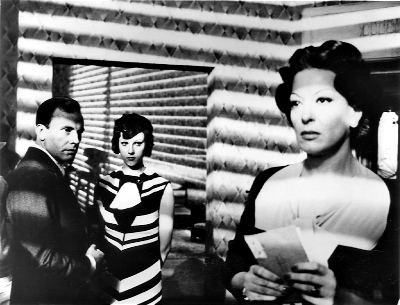 After a long delay, Paramount will finally be releasing two classic Bertolucci films, The Conformist (Il conformista) and 1900, on the 5th of December. The discs will be packed and reasonably priced (the 2-disc 1900 runs $19.99, while The Conformist is $14.99). Best of all, 1900 will be in its uncut 318-minute version. You can expect Bertolucci’s Before the Revolution sometime next year from Criterion.
After a long delay, Paramount will finally be releasing two classic Bertolucci films, The Conformist (Il conformista) and 1900, on the 5th of December. The discs will be packed and reasonably priced (the 2-disc 1900 runs $19.99, while The Conformist is $14.99). Best of all, 1900 will be in its uncut 318-minute version. You can expect Bertolucci’s Before the Revolution sometime next year from Criterion.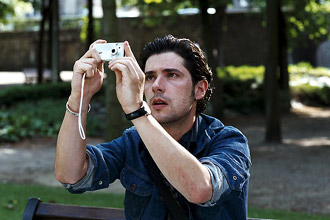 Strand will be releasing François Ozon’s latest, Time to Leave (Le temps qui reste) on November 21st. The melodrama stars Jeanne Moreau, Valerie Bruni-Tedeschi, and Melvil Poupaud as a fashion photographer who finds out he has brain cancer. The film got much stronger raves than Ozon’s last film, 5x2, also with Bruni-Tedeschi.
Strand will be releasing François Ozon’s latest, Time to Leave (Le temps qui reste) on November 21st. The melodrama stars Jeanne Moreau, Valerie Bruni-Tedeschi, and Melvil Poupaud as a fashion photographer who finds out he has brain cancer. The film got much stronger raves than Ozon’s last film, 5x2, also with Bruni-Tedeschi. If you’re in the mood for more melodrama, Criterion is releasing G.W. Pabst’s Pandora’s Box (Die Büchse der Pandora) on the same day, starring the iconic Louise Brooks. The disc will include two docs on Brooks, and I strongly suggest also picking up Kieslowski’s The Double Life of Véronique (La double-vie de Véronique), also from Criterion, on the same day.
If you’re in the mood for more melodrama, Criterion is releasing G.W. Pabst’s Pandora’s Box (Die Büchse der Pandora) on the same day, starring the iconic Louise Brooks. The disc will include two docs on Brooks, and I strongly suggest also picking up Kieslowski’s The Double Life of Véronique (La double-vie de Véronique), also from Criterion, on the same day. If drugs-and-crime flicks are your thing (they certainly aren’t mine), Magnolia will be putting out the Danish Pusher trilogy on November 7th, each directed by Nicolas Winding Refn. The set will include the original Pusher from 1996, Pusher 2: With Blood on My Hands from 2004, and the conclusion, Pusher 3: I’m the Angel of Death from 2005. The discs are also available separately.
If drugs-and-crime flicks are your thing (they certainly aren’t mine), Magnolia will be putting out the Danish Pusher trilogy on November 7th, each directed by Nicolas Winding Refn. The set will include the original Pusher from 1996, Pusher 2: With Blood on My Hands from 2004, and the conclusion, Pusher 3: I’m the Angel of Death from 2005. The discs are also available separately.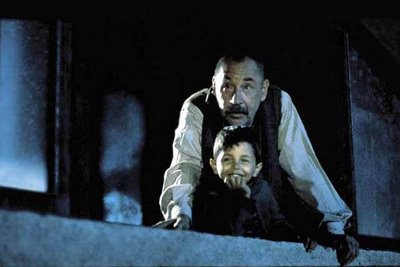 Nauseatingly, the Weinsteins will be releasing two special-er editions of their much beloved Cinema Paradiso, easily one of my least favorite films of all time, in November. The special-est edition will include the soundtrack. If you’re up for a disgustingly manipulative and “feel-good” time, have fun. And, yes, the discs will include both the U.S. theatrical version and the original director’s cut, which gives you over a half hour more shit to make you queasy.
Nauseatingly, the Weinsteins will be releasing two special-er editions of their much beloved Cinema Paradiso, easily one of my least favorite films of all time, in November. The special-est edition will include the soundtrack. If you’re up for a disgustingly manipulative and “feel-good” time, have fun. And, yes, the discs will include both the U.S. theatrical version and the original director’s cut, which gives you over a half hour more shit to make you queasy.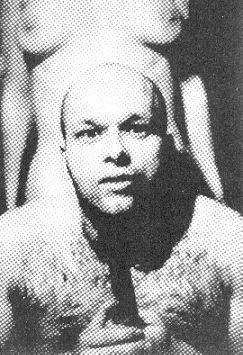 Ryko Distribution will re-release two out-of-print video-nasties on Halloween, Cannibal Ferox (also known as Make Them Die Slowly) and Jörg Buttgereit’s Schramm. The discs look to be identical to the previous releases. Unfortunately, Cinema Paradiso comes out a week later, or you could have had a stomach-churning Halloween marathon.
Ryko Distribution will re-release two out-of-print video-nasties on Halloween, Cannibal Ferox (also known as Make Them Die Slowly) and Jörg Buttgereit’s Schramm. The discs look to be identical to the previous releases. Unfortunately, Cinema Paradiso comes out a week later, or you could have had a stomach-churning Halloween marathon.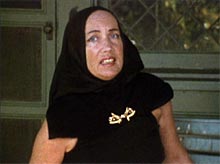 Just in time for Christmas, Criterion will re-release Grey Gardens in a 2-disc set, likely to cash in on the Broadway play and upcoming narrative remake, starring Jessica Lange and Drew Barrymore (scary, eh?). The second disc will feature the Maysles brothers’ The Beales of Grey Gardens, which puts together additional footage they took of Big and Little Edie.
Just in time for Christmas, Criterion will re-release Grey Gardens in a 2-disc set, likely to cash in on the Broadway play and upcoming narrative remake, starring Jessica Lange and Drew Barrymore (scary, eh?). The second disc will feature the Maysles brothers’ The Beales of Grey Gardens, which puts together additional footage they took of Big and Little Edie. IFC Films will release Brothers of the Head, which I strongly recommend on November 14th. The film uses fake archival footage of a fictitious pair of conjoined twins who become punk rock stars. You can read my review here.
IFC Films will release Brothers of the Head, which I strongly recommend on November 14th. The film uses fake archival footage of a fictitious pair of conjoined twins who become punk rock stars. You can read my review here.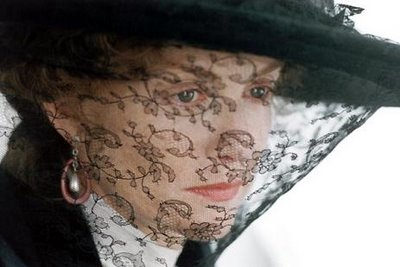 IFC will also be releasing Patrice Chéreau’s Gabrielle on the 19th of December. The film stars Isabelle Huppert in the title role, and while the film didn’t get a whole lot of critical praise, I hear both Huppert and the cinematography are exquisite.
IFC will also be releasing Patrice Chéreau’s Gabrielle on the 19th of December. The film stars Isabelle Huppert in the title role, and while the film didn’t get a whole lot of critical praise, I hear both Huppert and the cinematography are exquisite.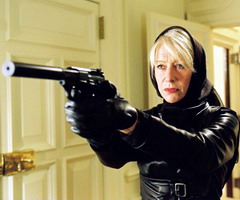 Touted as one of the year’s biggest critical failures, Shadowboxer will be out on November 7th. How can you resist the sexual pairings of Helen Mirren and Cuba Gooding Jr. (who’s really trying to get his Oscar revoked), not to mention Mysterious Skin’s Joseph Gordon-Levitt and Mo’nique? Sounds like a winner to me. For additional fun, a cracked-out Macy Gray plays an alcoholic and a cracked-out Stephen Dorff shows his condom-sheathed penis. Read my friend Brad’s review of it here. I don’t know how you’ll be able to resist after that.
Touted as one of the year’s biggest critical failures, Shadowboxer will be out on November 7th. How can you resist the sexual pairings of Helen Mirren and Cuba Gooding Jr. (who’s really trying to get his Oscar revoked), not to mention Mysterious Skin’s Joseph Gordon-Levitt and Mo’nique? Sounds like a winner to me. For additional fun, a cracked-out Macy Gray plays an alcoholic and a cracked-out Stephen Dorff shows his condom-sheathed penis. Read my friend Brad’s review of it here. I don’t know how you’ll be able to resist after that.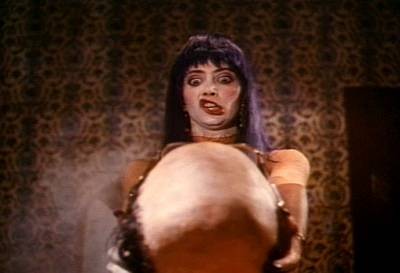 Oh, boy! Also in time for Halloween is Frankenhooker, which Unearthed Films will be releasing on the 17th of October. The tagline says something about “sluts and bolts.” Please pick it up and let me know if it’s worth my time. The title alone makes me wanna pre-order it, but I made a similar mistake with a film called Let Me Die a Woman!
Oh, boy! Also in time for Halloween is Frankenhooker, which Unearthed Films will be releasing on the 17th of October. The tagline says something about “sluts and bolts.” Please pick it up and let me know if it’s worth my time. The title alone makes me wanna pre-order it, but I made a similar mistake with a film called Let Me Die a Woman!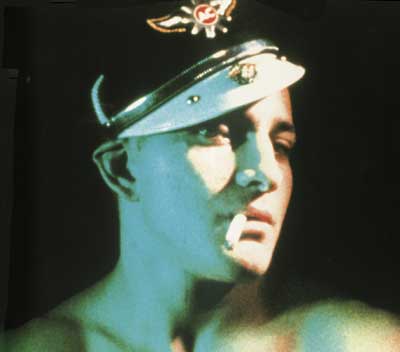 Fantoma will finally be releasing the first volume of their Kenneth Anger box set. Despite the photo I’m using above, the set will not include his most famous, Scorpio Rising. So buy this set and convince Fantoma that it’s worth their time to release the rest. Plus, Fireworks is great.
Fantoma will finally be releasing the first volume of their Kenneth Anger box set. Despite the photo I’m using above, the set will not include his most famous, Scorpio Rising. So buy this set and convince Fantoma that it’s worth their time to release the rest. Plus, Fireworks is great. Other Cinema is releasing video-artist Craig Baldwin’s Tribulation 99: Alien Anomalies Under America, a film solely comprised of found-footage worked into a science fiction tale. My asshole film professor should be kicking himself right now, as he said the film would never be readily available to the public, and felt like fucking Jonas Mekas for having it.
Other Cinema is releasing video-artist Craig Baldwin’s Tribulation 99: Alien Anomalies Under America, a film solely comprised of found-footage worked into a science fiction tale. My asshole film professor should be kicking himself right now, as he said the film would never be readily available to the public, and felt like fucking Jonas Mekas for having it.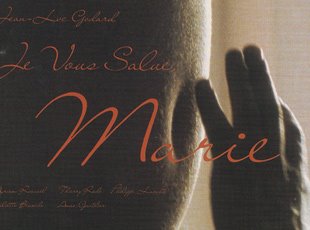 For the first time on DVD anywhere (I think), New Yorker is releasing Jean-Luc Godard’s Hail Mary (Je vous salue, Marie) next Tuesday. The film, which reportedly caused an outrage in the then-super Catholic France during the 1980s, reinterprets the virgin birth of Jesus in modern-day setting. A young Juliette Binoche has a supporting role as well.
For the first time on DVD anywhere (I think), New Yorker is releasing Jean-Luc Godard’s Hail Mary (Je vous salue, Marie) next Tuesday. The film, which reportedly caused an outrage in the then-super Catholic France during the 1980s, reinterprets the virgin birth of Jesus in modern-day setting. A young Juliette Binoche has a supporting role as well. And finally, Kino will be re-releasing Andrei Tarkovsky’s Stalker in a more affordable, more aesthetically-appealing disc on November 7th. Pick it up.
And finally, Kino will be re-releasing Andrei Tarkovsky’s Stalker in a more affordable, more aesthetically-appealing disc on November 7th. Pick it up.And I’m spent…
25 April 2006
In Your Stores 25 april 2006
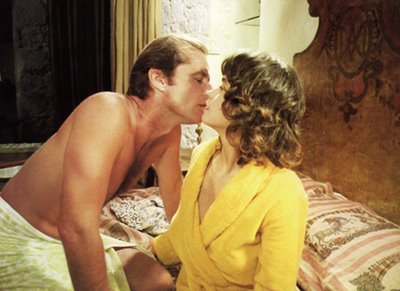 As I was sort of annoyed at thinking up clever tid-bits about all the weeks' new releases on DVD, I killed off my weekly listings. However, this week appears especially promising at the video store, so I thought I'd highlight a few of the notables. First off, we have Michelangelo Antonioni's The Passenger (Professione: reporter) with Jack Nicholson and Maria Schneider (above). While not nearly as strong as some of his earlier work, it's still worth a look, if only for its signature Antonioni ending and a memorable performance from Jack.
As I was sort of annoyed at thinking up clever tid-bits about all the weeks' new releases on DVD, I killed off my weekly listings. However, this week appears especially promising at the video store, so I thought I'd highlight a few of the notables. First off, we have Michelangelo Antonioni's The Passenger (Professione: reporter) with Jack Nicholson and Maria Schneider (above). While not nearly as strong as some of his earlier work, it's still worth a look, if only for its signature Antonioni ending and a memorable performance from Jack. Also on DVD this week is the latest Claire Denis film, The Intruder (L'intrus), which is supposed to be a lot better than her previous Vendredi soir and on par with some of her best work (Beau travail). Expect a review of this as soon as Netflix gets around to sending it to me. As you can see above, Béatrice Dalle has still not fixed the large gap between her two front teeth.
Also on DVD this week is the latest Claire Denis film, The Intruder (L'intrus), which is supposed to be a lot better than her previous Vendredi soir and on par with some of her best work (Beau travail). Expect a review of this as soon as Netflix gets around to sending it to me. As you can see above, Béatrice Dalle has still not fixed the large gap between her two front teeth.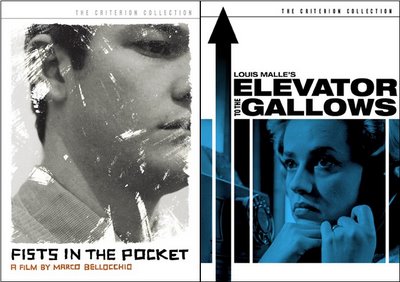
Criterion's got a pair of films you've probably never heard of from directors you probably have.
From Marco Bellocchio (Devil in the Flesh) comes Fists in the Pocket (I pugni in tasca), a "horror film" about an epileptic, and from Louis Malle (Au revoir les enfants), his first feature film, Elevator to the Gallows (Ascenseur pour l'échafaud) stars Jeanne Moreau as a woman who wants to kill her husband.
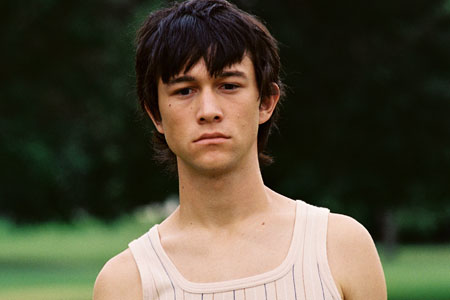 Strand is releasing a deluxe edition of Gregg Araki's Mysterious Skin, a film that ranked high in my best of 2005 list, after acquiring the rights from Tartan. As the disc is no less expensive than the Tartan one was, purchasing this instead seems unnecessary, as the only deluxe addition seems to be cast audition tapes and some deleted scenes. I e-mailed Strand to see if they were planning on obtaining the rights to the rest of Araki's titles (they've already released Totally Fucked Up; The Doom Generation and The Living End are in need of new transfers; and Nowhere and Three Bewildered People in the Night have yet to make it to DVD), but they did not respond.
Strand is releasing a deluxe edition of Gregg Araki's Mysterious Skin, a film that ranked high in my best of 2005 list, after acquiring the rights from Tartan. As the disc is no less expensive than the Tartan one was, purchasing this instead seems unnecessary, as the only deluxe addition seems to be cast audition tapes and some deleted scenes. I e-mailed Strand to see if they were planning on obtaining the rights to the rest of Araki's titles (they've already released Totally Fucked Up; The Doom Generation and The Living End are in need of new transfers; and Nowhere and Three Bewildered People in the Night have yet to make it to DVD), but they did not respond.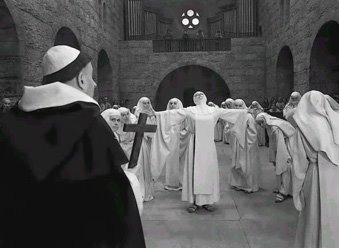 For the nun lovers out there (you know who you are), Jerzy Kawalerowicz's Mother Joan of the Angels (Matka Joanna od aniolów), based on The Devils of Loudon (the source material for Ken Russell's far more decadent The Devils), is on DVD now. Lionsgate is also releasing a Spanish horror film titled simply The Nun (La monja), which looks awful but does have the hilarious tagline, "Not all water is holy." This should hold the nun fetishists over for a while.
For the nun lovers out there (you know who you are), Jerzy Kawalerowicz's Mother Joan of the Angels (Matka Joanna od aniolów), based on The Devils of Loudon (the source material for Ken Russell's far more decadent The Devils), is on DVD now. Lionsgate is also releasing a Spanish horror film titled simply The Nun (La monja), which looks awful but does have the hilarious tagline, "Not all water is holy." This should hold the nun fetishists over for a while. In music DVD, you can finally fulfill your secret desire to mention Suicide, Captain Beefheart, and Mariah Carey in the same sentence. The Suicide disc is a live concert in Paris, which looks to be a recent concert with poor artwork, so be cautious. The Captain Beefheart disc is a two-hour documentary about the man himself. The Mariah Carey disc is a Behind the Music-esque exploration of how this diva has stood the test of time.
In music DVD, you can finally fulfill your secret desire to mention Suicide, Captain Beefheart, and Mariah Carey in the same sentence. The Suicide disc is a live concert in Paris, which looks to be a recent concert with poor artwork, so be cautious. The Captain Beefheart disc is a two-hour documentary about the man himself. The Mariah Carey disc is a Behind the Music-esque exploration of how this diva has stood the test of time.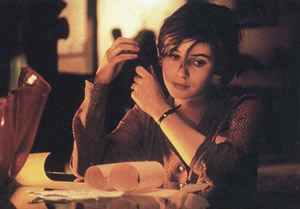 Artificial Eye UK is releasing Krzysztof Kieslowski's The Double Life of Véronique (La double vie de Véronique), which is still unavailable on DVD in the US. Irène Jacob (who won the Best Actress prize at Cannes) plays two women (Véronique and Weronika) born on the same day, one in France, the other in Poland. Though I haven't seen The Decalogue, this film marked, for me, Kieslowski's wonderful turn from boring Polish realism to cinematic treats.
Artificial Eye UK is releasing Krzysztof Kieslowski's The Double Life of Véronique (La double vie de Véronique), which is still unavailable on DVD in the US. Irène Jacob (who won the Best Actress prize at Cannes) plays two women (Véronique and Weronika) born on the same day, one in France, the other in Poland. Though I haven't seen The Decalogue, this film marked, for me, Kieslowski's wonderful turn from boring Polish realism to cinematic treats. If you like melodramatic Spanish romances about two lovers with palindrome names, then check out Lovers of the Arctic Circle (Los amantes del Círculo Polar). The film stars Fele Martínez (Bad Education) and Najwa Nimri (Sex and Lucia).
If you like melodramatic Spanish romances about two lovers with palindrome names, then check out Lovers of the Arctic Circle (Los amantes del Círculo Polar). The film stars Fele Martínez (Bad Education) and Najwa Nimri (Sex and Lucia).Woody Allen's Match Point, reviewed below, and Werner Herzog's Where the Green Ants Dream (Wo die grünen Ameisen träumen) are also being released, though most will note these as lesser entries on the directors' filmographies.
Subscribe to:
Posts (Atom)






